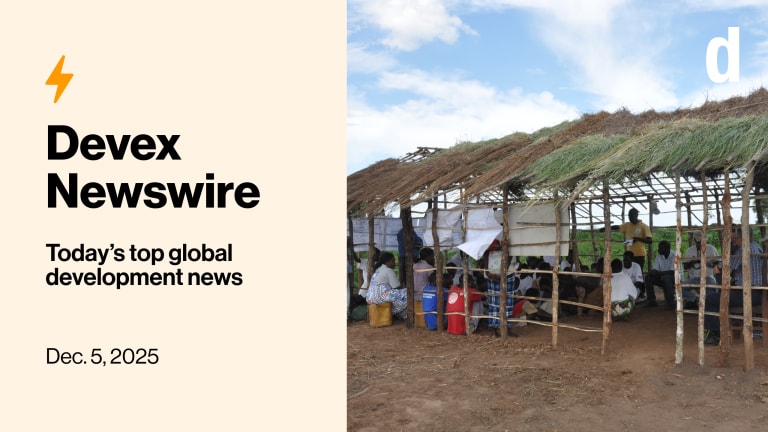
When a crisis of any kind occurs in the world — natural disaster, armed conflict, ethnic violence — countless numbers of people are affected in some way. And for those impacted directly, it takes the combined effort of the community members living the crisis, aid organizations, governments and volunteers to not only respond immediately but to come up lasting solutions.
The members of the International Red Cross and Red Crescent Movement are usually among the first organizations on the front lines of crises. In December, leaders from the organization will meet with governments from 194 countries at their 32nd International Conference, to discuss current and future action in addressing humanitarian challenges.
Ahead of the conference, they have launched the “Voices to Action” initiative to make sure that the messages voiced by members of local communities around the world are clearly communicated and incorporated into the global action agenda. One of these voices is 25-year-old Liberian Lee Menlee Wehyee, a resident of Nimba County and volunteer for the Nimba Chapter of the Liberian Red Cross. He got involved with the organization when he heard about volunteer opportunities on the local radio. He had wanted to help others for a long time so he jumped at this chance.
Devex talked to Wehyee about his volunteer experience in responding to the Ebola outbreak in his community and the messages he’d like taken to the international conference. Below are excerpts from the conversation.
You have been a volunteer with your local Red Cross since last year. What volunteer services are you providing and where do you focus your time?
I work on fostering community awareness about disaster preparedness, health issues and the need for vaccinations — to protect children from things like measles and polio, for example. In times of crisis I also provide support to staff who do disaster assessments and deliver aid. During the Ebola outbreak, we were in the community giving people information about the disease and telling them how to avoid catching it. In my experience as a Red Cross volunteer, we are always trained before going into a particular community to perform a task. We learn things like how to enter a community and get the local authorities involved. Thanks to the training, I know how to approach a community and interact freely with the residents.
You were a volunteer from early in the Ebola outbreak through the peak of the crisis to now after Liberia has been declared Ebola free. Tell us about your experience.
I was part of the social mobilization team. We were trained and assigned to various communities: We brought in posters with information on Ebola, and we spoke with people to make sure they understood the key points. Some of the people could not read and found it hard to believe that Ebola was real, so we had to convince them.
To be honest, my experience was very tedious. Ebola was infecting people in so many communities, so we had to make sure people understood what was going on, and how they could protect themselves and their family. It was very challenging to be responsive to people, who were all so scared. In some communities, dead bodies were lying on the ground around us. People were afraid to touch them, because medical professionals warned that the virus is dangerous even in dead bodies. So no one wanted to go into those communities. But thanks to our training in social mobilization, we knew how to protect ourselves and help others. None of us were infected because we followed the hygiene rules. The information we gave to the people helped them survive.
How has this experience changed you?
My training and experience as a Red Cross volunteer has changed me greatly. I am even more devoted to humanitarian work than before. When people look at me they see a new person — they respect me more. And they are thankful to the Red Cross for the help we provide. During the Ebola crisis, for example, we went into dangerous communities where no one else wanted to go. So at the end of the day, people recognize the role we played and the services we provided. They see us as heroes in the community. I get the sense I am making an impact when I see the looks of appreciation from the community members every day. It makes me proud of my work, and I am really motivated to do more through the Red Cross.
While Ebola may remain ever present in people’s minds, are there other struggles in Nimba that should be discussed at the upcoming international conference?
There are a lot of messages that need to be sent to the international conference, but the most challenging issues here are sanitation, health, water and personal hygiene. We need, for example, hand pumps for safe drinking water, and latrines in our communities. The Red Cross provides many of the needed services, especially in terms of psycho-social support. Still, many towns and communities here do not have health clinics. This means that families have to take sick relatives to distant hospitals, and sometimes they die on the way. This is our reality and these are points I want to be stressed and discussed by governments and Red Cross leaders at the international conference in December.
More about the Voices to Action Initiative
The Voices to Action initiative is gathering ideas and solutions to address local humanitarian challenges through www.voicestoaction.org and a series of “humanitarian hub” events in Honduras, Lebanon, Bangladesh, Liberia and others. These events will bring together community members and leaders, volunteers, NGOs and government representatives to foster collaboration and discuss local needs and action.
The latest event is happening in Sanniquellie, Nimba county, Liberia. On Sept. 2, members of the community gathered with local and national policy makers, national Red Cross and other local NGOs to talk about the most pressing local humanitarian challenges, such as limited access to safe drinking water, lack of latrines, access to health care, bad conditions of roads and access to education. The discussion continues on Sept. 3, focusing on local innovative solutions to address these challenges.
Community needs and proposed solutions gathered on the Voices to Action website and at the hub events will be presented at the International Conference in December.
Join the Devex community and access more in-depth analysis, breaking news and business advice — and a host of other services — on international development, humanitarian aid and global health.








